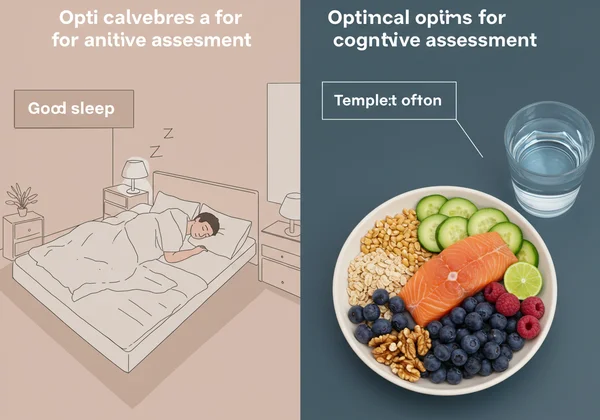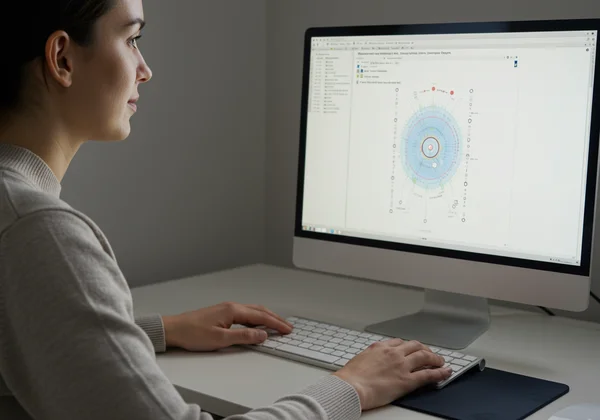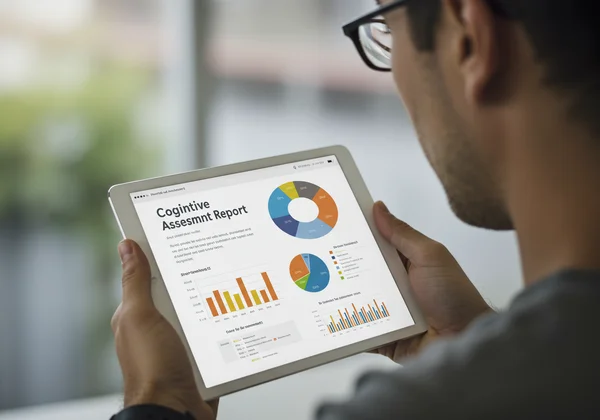เตรียมตัวสำหรับการประเมินความรู้ความเข้าใจของคุณ: เคล็ดลับเพื่อผลลัพธ์ที่แม่นยำ
August 26, 2025 | By Gideon Albright
รู้สึกประหม่าเล็กน้อยเกี่ยวกับการ ประเมินความรู้ความเข้าใจ ที่กำลังจะมาถึงใช่ไหม? คุณไม่ได้อยู่คนเดียว หลายคนรู้สึกผสมผสานระหว่างความอยากรู้อยากเห็นและความกังวล ไม่ว่าคุณจะกำลังดูแลสุขภาพสมองล่วงหน้า, สำรวจข้อกังวลสำหรับคนที่คุณรัก, หรือเพียงแค่อยากรู้เกี่ยวกับความแข็งแกร่งทางจิตใจของคุณ, เป้าหมายก็ยังคงเหมือนเดิมเสมอ: เพื่อให้ได้ภาพที่ชัดเจนและแม่นยำเกี่ยวกับความสามารถทางปัญญาของคุณ แต่ ฉันจะทดสอบความสามารถทางปัญญาของฉันที่บ้านได้อย่างไร ในแบบที่สะท้อนความสามารถที่แท้จริงของฉัน? คู่มือนี้จะให้คำแนะนำที่ใช้งานได้จริงและอิงตามหลักวิทยาศาสตร์ เพื่อช่วยให้คุณเข้าถึงกระบวนการนี้ด้วยความมั่นใจและชัดเจน
จุดประสงค์ของการเตรียมตัวไม่ใช่เพื่อ "ทำคะแนนให้ดีที่สุดในการทดสอบ" แต่เพื่อให้แน่ใจว่าปัจจัยชั่วคราว เช่น ความเครียดหรือความเหนื่อยล้า จะไม่รบกวนผลลัพธ์ของคุณ ด้วยการทำตามขั้นตอนเหล่านี้ คุณจะสร้างเงื่อนไขที่ดีที่สุดเท่าที่จะเป็นไปได้เพื่อให้จิตใจของคุณทำงานได้อย่างเต็มที่ ซึ่งจะให้ข้อมูลเชิงลึกที่มีคุณค่าที่สุดแก่คุณ เมื่อคุณพร้อม คุณสามารถ ทำการทดสอบที่ครอบคลุมของเรา เพื่อดูว่าคุณอยู่ตรงไหน
การเตรียมตัวที่จำเป็นก่อนการประเมิน
การเตรียมตัวที่เหมาะสมเริ่มต้นขึ้นก่อนที่คุณจะเริ่มคำถามแรกนานพอสมควร เช่นเดียวกับนักกีฬาที่เตรียมตัวสำหรับการแข่งขัน การจัดเตรียมสภาพแวดล้อมสำหรับการทำงานของจิตใจนั้นสำคัญอย่างยิ่งสำหรับการ ทดสอบการประเมินความรู้ความเข้าใจ ที่แม่นยำ หลักการพื้นฐานเหล่านี้ช่วยให้แน่ใจว่าผลลัพธ์สะท้อนถึงทักษะความรู้ความเข้าใจที่แท้จริงของคุณ ไม่ใช่แค่ความรู้สึกของคุณในวันใดวันหนึ่ง
ปรับการนอนหลับของคุณให้เหมาะสมเพื่อประสิทธิภาพสูงสุด
การนอนหลับไม่ใช่สิ่งฟุ่มเฟือย แต่เป็นเสาหลักพื้นฐานของการทำงานของความรู้ความเข้าใจ งานวิจัยแสดงให้เห็นอย่างสม่ำเสมอว่าการนอนหลับที่มีคุณภาพตลอดคืนช่วยเสริมสร้างเครือข่ายประสาทที่จำเป็นสำหรับการรวมความจำ การแก้ปัญหา และความสนใจ เมื่อคุณพักผ่อนไม่เพียงพอ เวลาตอบสนองของคุณจะช้าลง สมาธิของคุณจะลดลง และความสามารถในการคิดเชิงวิพากษ์ของคุณจะลดลงอย่างมาก
เพื่อให้แน่ใจว่าสมองของคุณได้รับการพักผ่อนและพร้อมแล้ว ให้ตั้งเป้าหมายการนอนหลับ 7-9 ชั่วโมงโดยไม่ถูกรบกวนในคืนก่อนการประเมิน หลีกเลี่ยงคาเฟอีนและอาหารมื้อหนักใกล้เวลานอน และพยายามสร้างกิจวัตรการผ่อนคลายก่อนนอน ขั้นตอนง่ายๆ นี้เป็นหนึ่งในวิธีที่มีประสิทธิภาพที่สุดในการสนับสนุนความสามารถตามธรรมชาติของสมองของคุณ และเป็นส่วนสำคัญของการ ฝึกประเมินความรู้ความเข้าใจ ที่ดี
เติมพลังสมองของคุณ: การดื่มน้ำและโภชนาการ
สิ่งที่คุณกินและดื่มมีผลกระทบโดยตรงต่อประสิทธิภาพการทำงานของสมอง การขาดน้ำ แม้ในระดับเล็กน้อย ก็สามารถนำไปสู่อาการสมองตื้อ สมาธิลดลง และการหลงลืมได้ ตรวจสอบให้แน่ใจว่าคุณได้รับน้ำเพียงพอตลอดทั้งวันก่อนการประเมิน โดยการดื่มน้ำให้เพียงพอ
ในทำนองเดียวกัน สมองของคุณต้องการพลังงานเพื่อทำงานได้อย่างเหมาะสม อาหารที่สมดุลซึ่งประกอบด้วยคาร์โบไฮเดรตเชิงซ้อน โปรตีนไม่ติดมัน และไขมันดี สามารถให้พลังงานที่ยั่งยืนได้ อาหารที่อุดมด้วยโอเมก้า 3 (เช่น ปลาหรือวอลนัท) และสารต้านอนุมูลอิสระ (เช่น เบอร์รี่) มีประโยชน์เป็นพิเศษต่อสุขภาพสมอง หลีกเลี่ยงขนมหรือเครื่องดื่มที่มีน้ำตาลก่อนการทดสอบโดยตรง เนื่องจากอาจทำให้พลังงานพุ่งสูงขึ้นตามด้วยการลดลงอย่างรวดเร็ว ซึ่งจะรบกวนสมาธิของคุณ สมองที่ทำงานได้อย่างเต็มประสิทธิภาพคือสมองที่พร้อมสำหรับการ ประเมินความรู้ความเข้าใจฟรี

สร้างสภาพแวดล้อมการทดสอบที่เหมาะสม
สภาพแวดล้อมของคุณสามารถสนับสนุนสมาธิของคุณหรือบั่นทอนสมาธิของคุณได้ เพื่อให้ได้ผลลัพธ์ที่แม่นยำที่สุดจากการ ประเมินความรู้ความเข้าใจออนไลน์ คุณต้องลดสิ่งรบกวนให้น้อยที่สุด หาสถานที่ที่เงียบสงบและสะดวกสบาย ซึ่งคุณไม่น่าจะถูกรบกวนตลอดระยะเวลาการทดสอบ นี่เป็นหนึ่งใน เคล็ดลับการประเมินความรู้ความเข้าใจ ที่สำคัญที่สุด
ก่อนที่คุณจะเริ่มต้น ให้ปิดเสียงโทรศัพท์และปิดการแจ้งเตือนบนคอมพิวเตอร์ของคุณ ปิดแท็บหรือแอปพลิเคชันที่ไม่จำเป็น บอกสมาชิกในครอบครัวหรือเพื่อนร่วมห้องว่าคุณต้องการเวลาที่ต้องการสมาธิ สภาพแวดล้อมที่สงบและควบคุมได้ช่วยให้คุณสามารถทุ่มเททรัพยากรทางจิตใจทั้งหมดให้กับงานที่ทำอยู่ เพื่อให้แน่ใจว่าการประเมินจะวัดความสามารถทางปัญญาของคุณ ไม่ใช่ความสามารถในการทำงานหลายอย่างพร้อมกันภายใต้ความกดดัน การจัดเตรียมที่เหมาะสมมีความสำคัญอย่างยิ่งสำหรับการ ประเมินความสามารถทางปัญญา

กลยุทธ์ระหว่างการทดสอบความรู้ความเข้าใจของคุณ
เมื่อคุณเตรียมร่างกายและสภาพแวดล้อมของคุณพร้อมแล้ว ก็ถึงเวลาที่จะมุ่งเน้นไปที่ทัศนคติและแนวทางของคุณในระหว่างการประเมิน กลยุทธ์เหล่านี้จะช่วยให้คุณจัดการกับงานต่างๆ ได้อย่างใจเย็นและมีประสิทธิภาพ ทำให้แน่ใจว่าคุณสามารถแสดงความสามารถของคุณได้โดยไม่ถูกขัดขวางด้วยความวิตกกังวลหรือความสับสน
ทำความเข้าใจคำแนะนำอย่างละเอียด
นี่อาจฟังดูชัดเจน แต่เป็นหนึ่งในข้อผิดพลาดที่พบบ่อยที่สุด การทดสอบความรู้ความเข้าใจหลายอย่างเกี่ยวข้องกับงานที่ไม่คุ้นเคยที่คุณไม่เคยเจอมาก่อน การรีบทำภารกิจโดยไม่เข้าใจวัตถุประสงค์อย่างถ่องแท้ อาจนำไปสู่ข้อผิดพลาดที่ไม่มีส่วนเกี่ยวข้องกับความสามารถทางปัญญาที่แท้จริงของคุณ
ใช้เวลาของคุณในการอ่านหรือฟังคำแนะนำทุกข้ออย่างระมัดระวัง หากมีคำถามฝึกหัด ให้ใช้เพื่อตรวจสอบให้แน่ใจว่าคุณเข้าใจวิธีการทำภารกิจ แพลตฟอร์มของเราได้รับการออกแบบด้วยคำแนะนำที่ชัดเจนและใช้งานง่าย เพื่อนำทางคุณผ่านแต่ละส่วนของ การทดสอบความรู้ความเข้าใจออนไลน์ ความอดทนเพียงชั่วขณะในตอนเริ่มต้นของแต่ละส่วนสามารถช่วยคุณให้พ้นจากความสับสนและความหงุดหงิดในภายหลังได้
จัดการความวิตกกังวลและความเครียดในการทดสอบ
เป็นเรื่องปกติอย่างยิ่งที่จะรู้สึกกดดันเล็กน้อยในระหว่างการทดสอบ อย่างไรก็ตาม ความวิตกกังวลในระดับสูงสามารถรบกวนความจำใช้งานและหน้าที่บริหารจัดการ ซึ่งเป็นทักษะที่กำลังถูกวัดอยู่ กุญแจสำคัญคือการจัดการความเครียดนี้เพื่อไม่ให้ขัดขวางประสิทธิภาพของคุณ
หากคุณรู้สึกวิตกกังวล ให้ใช้เวลาสักครู่เพื่อหยุดพักและหายใจ การหายใจช้าๆ ลึกๆ สองสามครั้งสามารถช่วยให้ระบบประสาทของคุณสงบลงและนำสมาธิของคุณกลับมาสู่ปัจจุบันได้ เตือนตัวเองว่านี่ไม่ใช่การสอบที่วัดผลแพ้-ชนะ แต่เป็นเครื่องมือสำหรับข้อมูลเชิงลึกและการทำความเข้าใจตนเอง เป้าหมายคือการรวบรวมข้อมูลที่สามารถช่วยคุณได้ ไม่ใช่เพื่อให้ได้คะแนนที่สมบูรณ์แบบ

จัดจังหวะของคุณอย่างชาญฉลาด
การประเมินความรู้ความเข้าใจส่วนใหญ่ประกอบด้วยงานที่หลากหลาย ซึ่งบางงานอาจมีการจับเวลา สิ่งสำคัญคือการรักษาสมดุลระหว่างการทำงานอย่างมีประสิทธิภาพและการรีบร้อนอย่างไม่ระมัดระวัง พยายามอย่าใช้เวลามากเกินไปกับคำถามเดียวที่คุณพบว่ายากเป็นพิเศษ หากคุณติดอยู่กับคำถาม บ่อยครั้งการเลือกคำตอบที่คิดว่าใกล้เคียงที่สุดแล้วไปต่อจะดีกว่า
โปรดจำไว้ว่า การประเมินหลายอย่างถูกออกแบบมาให้มีความท้าทายเพิ่มขึ้นเรื่อยๆ คุณไม่จำเป็นต้องตอบทุกคำถามให้ถูกต้อง การจัดจังหวะตัวเองช่วยให้แน่ใจว่าคุณมีเวลาและพลังงานทางจิตใจเพียงพอที่จะพยายามทำทุกส่วนของการทดสอบ ไม่ว่าคุณจะ ลองทดสอบความจำ หรือการประเมินที่ครอบคลุมมากขึ้น จังหวะที่สม่ำเสมอคือพันธมิตรที่ดีที่สุดของคุณ
สิ่งที่คาดหวังหลังจากการประเมินของคุณ
การประเมินให้เสร็จสิ้นเป็นเพียงก้าวแรก การทำความเข้าใจสิ่งที่จะเกิดขึ้นต่อไปมีความสำคัญอย่างยิ่งในการเปลี่ยนผลลัพธ์ของคุณให้เป็นการกระทำที่มีความหมาย รายงานของคุณเป็นแหล่งข้อมูลที่อุดมสมบูรณ์ และการรู้วิธีการเข้าถึงจะช่วยเสริมสร้างเส้นทางสุขภาพทางปัญญาของคุณ
การตีความผลลัพธ์ของคุณอย่างแม่นยำ
ผลลัพธ์ของคุณคือภาพสะท้อนของประสิทธิภาพการรู้คิดของคุณ ณ จุดใดจุดหนึ่งในเวลา มันจะเน้นย้ำถึงจุดแข็งทางปัญญาของคุณและระบุพื้นที่ที่อาจเป็นเรื่องท้าทายสำหรับคุณ หลีกเลี่ยงการมองคะแนนเป็นป้ายกำกับหรือการตัดสินขั้นสุดท้าย แต่ให้มองว่าเป็นข้อมูลที่มีคุณค่าซึ่งเป็นจุดเริ่มต้นสำหรับการทำความเข้าใจโปรไฟล์การรู้คิดที่เป็นเอกลักษณ์ของคุณ
บนแพลตฟอร์มของเรา การวิเคราะห์ที่ขับเคลื่อนด้วย AI ไม่ได้ให้แค่ตัวเลขเท่านั้น เรานำเสนอรายงานโดยละเอียดที่แปลผลการปฏิบัติงานของคุณให้เป็นข้อเสนอแนะที่นำไปปฏิบัติได้ อธิบายจุดแข็ง ความท้าทาย และขั้นตอนปฏิบัติจริงถัดไปของคุณ เมื่อคุณ ได้รับรายงานโดยละเอียดของคุณ คุณจะได้รับแผนที่นำทางส่วนบุคคลสำหรับการจัดการสุขภาพสมองเชิงรุก

การหารือเกี่ยวกับการประเมินของคุณกับผู้เชี่ยวชาญ
แม้ว่าเครื่องมือของเราจะให้ความแม่นยำและข้อมูลเชิงลึกที่ไม่มีใครเทียบได้ แต่สิ่งสำคัญคือต้องจำไว้ว่านี่ไม่ใช่เครื่องมือสำหรับการวินิจฉัย ไม่สามารถและไม่ควรใช้แทนการปรึกษาหารือกับผู้เชี่ยวชาญด้านสุขภาพที่มีคุณสมบัติเหมาะสม หากผลลัพธ์ของคุณทำให้เกิดข้อกังวลใดๆ หรือหากคุณกังวลเกี่ยวกับอาการเฉพาะ เช่น การสูญเสียความจำ การปรึกษาหารือกับแพทย์หรือผู้เชี่ยวชาญของคุณเป็นสิ่งสำคัญ
ผลลัพธ์การประเมินของคุณสามารถเป็นจุดเริ่มต้นที่มีประโยชน์อย่างยิ่งสำหรับการสนทนานั้น การแบ่งปันรายงานของคุณสามารถให้ข้อมูลที่เป็นกลางแก่แพทย์ของคุณ ช่วยให้พวกเขาเข้าใจข้อกังวลของคุณได้ชัดเจนยิ่งขึ้น นี่เป็นขั้นตอนที่มีความรับผิดชอบและเชิงรุกสำหรับทุกคนที่ทำการ ประเมินความรู้ความเข้าใจสำหรับผู้ใหญ่
เสริมสร้างเส้นทางความรู้ความเข้าใจของคุณด้วยความมั่นใจ
การเตรียมตัวสำหรับการประเมินความรู้ความเข้าใจคือการเสริมสร้างศักยภาพให้ตัวคุณเองเพื่อให้ได้ผลลัพธ์ที่แม่นยำและมีข้อมูลเชิงลึกมากที่สุดเท่าที่จะเป็นไปได้ ด้วยการทำให้แน่ใจว่าคุณได้พักผ่อนอย่างเต็มที่ ได้รับสารอาหารที่เหมาะสม และอยู่ในสภาพแวดล้อมที่มีสมาธิ คุณกำลังสร้างเวทีให้สมองของคุณทำงานได้อย่างเต็มที่ ในระหว่างการทดสอบ การจัดการความคิดและการจัดจังหวะของคุณจะช่วยให้คุณรับมือกับความท้าทายที่นำเสนอได้อย่างมั่นใจ
ท้ายที่สุดแล้ว การประเมินความรู้ความเข้าใจเป็นเครื่องมืออันทรงพลังสำหรับการค้นพบตนเองและการดูแลสุขภาพเชิงรุก มันนำเสนอหน้าต่างที่ไม่เหมือนใครสู่การทำงานของจิตใจของคุณ ให้ความชัดเจนที่จำเป็นในการบำรุงจุดแข็งของคุณและสนับสนุนความท้าทายของคุณ ตอนนี้คุณพร้อมด้วยเคล็ดลับเหล่านี้แล้ว คุณก็พร้อมที่จะก้าวไปอีกขั้น เริ่มต้นเส้นทางความรู้ความเข้าใจของคุณ วันนี้ด้วยความมั่นใจ
คำถามที่พบบ่อยเกี่ยวกับการประเมินความรู้ความเข้าใจ
ฉันจะแน่ใจได้อย่างไรว่าผลการประเมินความรู้ความเข้าใจแม่นยำ?
เพื่อให้แน่ใจในความแม่นยำ ให้มุ่งเน้นที่การเตรียมตัว: นอนหลับให้เต็มอิ่มตลอดคืน รับประทานอาหารที่มีประโยชน์ และดื่มน้ำให้เพียงพอ ในระหว่างการทดสอบ ให้หาสภาพแวดล้อมที่เงียบสงบ ปราศจากสิ่งรบกวน อ่านคำแนะนำทั้งหมดอย่างละเอียด และจัดการกับความวิตกกังวลด้วยการหายใจลึกๆ เป้าหมายคือการลดปัจจัยภายนอกอื่นๆ ให้น้อยที่สุด เพื่อให้การทดสอบสะท้อนถึงความสามารถที่แท้จริงของคุณ แพลตฟอร์มของเรามี [เครื่องมือประเมินความรู้ความเข้าใจของเรา] ที่หลากหลายซึ่งออกแบบมาเพื่อความชัดเจนและแม่นยำ
ฉันจะทดสอบความสามารถทางปัญญาของฉันที่บ้านได้อย่างไร?
คุณสามารถทดสอบความสามารถทางปัญญาของคุณที่บ้านได้อย่างง่ายดายและน่าเชื่อถือโดยใช้แพลตฟอร์มออนไลน์ที่ออกแบบตามหลักวิทยาศาสตร์ แพลตฟอร์มของเรานำเสนอการประเมินที่ครอบคลุมซึ่งขับเคลื่อนด้วย AI ซึ่งสร้างขึ้นโดยนักประสาทวิทยาและผู้เชี่ยวชาญด้าน AI โดยให้วิธีการที่เข้าถึงได้และเป็นความลับในการประเมินพื้นที่สำคัญๆ เช่น ความจำ ความสนใจ และการทำงานของผู้บริหาร จากความสะดวกสบายในบ้านของคุณ คุณสามารถ [ทดสอบความสามารถทางปัญญาของคุณ] และรับรายงานโดยละเอียดพร้อมข้อมูลเชิงลึกที่นำไปปฏิบัติได้
จะเกิดอะไรขึ้นหากผลการทดสอบความรู้ความเข้าใจของฉันแสดงข้อกังวล?
หากผลลัพธ์ของคุณบ่งชี้ถึงปัญหาที่อาจเกิดขึ้นหรือประเด็นที่น่ากังวล ขั้นตอนแรกคือไม่ต้องกังวล ให้มองว่าผลลัพธ์เป็นข้อมูลที่มีคุณค่า ไม่ใช่การวินิจฉัยโรค ขั้นตอนต่อไปที่แนะนำคือการแบ่งปันและหารือรายงานของคุณกับผู้เชี่ยวชาญด้านสุขภาพ เช่น แพทย์ของคุณหรือผู้เชี่ยวชาญ พวกเขาสามารถให้การประเมินทางคลินิกอย่างเต็มรูปแบบ ตีความผลลัพธ์ในบริบทของสภาวะสุขภาพโดยรวมของคุณ และแนะนำแนวทางการปฏิบัติที่เหมาะสม
คนเราควรเข้ารับการทดสอบความรู้ความเข้าใจเมื่ออายุเท่าไหร่?
ไม่มีอายุ "ที่เหมาะสม" เพียงอายุเดียวสำหรับการประเมินความรู้ความเข้าใจ ผู้ใหญ่หลายคนเลือกที่จะเข้ารับการประเมินเพื่อสร้างเกณฑ์มาตรฐานด้านสุขภาพที่พวกเขาสามารถอ้างอิงกลับไปได้ในภายหลังในชีวิต นอกจากนี้ยังแนะนำสำหรับบุคคลทุกวัยที่สังเกตเห็นการเปลี่ยนแปลงในความจำหรือความคิดของตน หรือสำหรับผู้ที่เพียงต้องการทำความเข้าใจโปรไฟล์ความรู้ความเข้าใจของตนเพื่อการพัฒนาตนเอง ซึ่งอาจเป็นประโยชน์อย่างยิ่งสำหรับผู้ใหญ่ที่มีอายุมากกว่า 50 ปีที่มุ่งเน้นไปที่สุขภาพสมองเชิงรุก